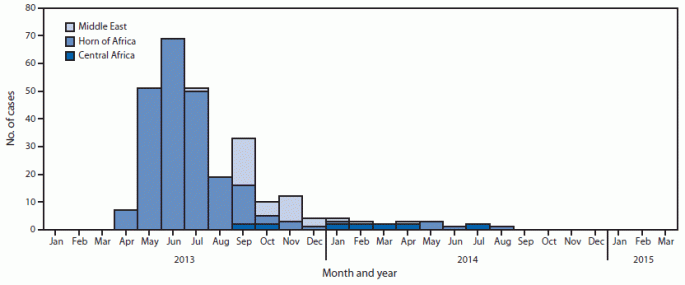Note: This was cross-posted to my own blog.
I came across a very encouraging article in last week’s MMWR (the CDC’s Morbidity and Mortality Weekly Report) this morning about polio eradication. After several reappearances in 2013, cases are down again this year and, if things continue to go well, the end may be in sight:
Four of six WHO regions have been certified as free of indigenous WPV, and endemic transmission of WPV continued in only three countries in 2014. In 2013, the global polio eradication effort suffered setbacks with outbreaks in the Horn of Africa, Central Africa, and the Middle East; however, significant progress was made in 2014 in response to all three outbreaks. Nonetheless, the affected regions remain vulnerable to WPV re-importation from endemic areas and to low-level, undetected WPV circulation. Continued response activities are needed in these regions to further strengthen AFP surveillance and eliminate immunity gaps through high-quality SIAs and strong routine immunization programs.
Progress in Nigeria since 2012 has brought the goal of interrupting the last known chains of indigenous WPV transmission in Africa within reach. Elimination of all poliovirus transmission in Nigeria in the near term is feasible, through intensified efforts to 1) interrupt cVDPV2 transmission, 2) strengthen routine immunization services, and 3) increase access to children in insecure areas. Similar efforts should be implemented in all countries in Africa, where 9 months have passed without a reported WPV case, and 6 months have passed since the last reported cVDPV2 case.

*Central Africa (Cameroon and Equatorial Guinea), Horn of Africa (Ethiopia and Somalia), and Middle East (Iraq and Syria).
The eradication push has suffered major blows in the last two years. In 2013, after six years of being polio-free, a major outbreak in Somalia contributed more polio cases to the year’s tally than the rest of the world combined; meanwhile, the virus made its way back into Syria that same fall after a 14-year hiatus. Luckily, extraordinary efforts in the midst of conflict zones on the part of health workers were able to beat the virus back to the heart of the fight – the final three countries in which it remains endemic.

Most (86%) WPV cases in Afghanistan in 2014 resulted from importation from Pakistan; however, the detection of orphan viruses highlights the need to strengthen the quality of both polio vaccination and AFP surveillance (10). Efforts are also needed to increase population immunity by intensifying routine polio immunization activities to ensure high coverage among infants with at least 3 OPV doses.
Recent challenges to the secure operation and public acceptance of the polio eradication program in Pakistan are unprecedented (10). Although poliovirus transmission has been concentrated primarily in the FATA region of northwest Pakistan, transmission has continued in the greater Karachi area, and WPV cases have been reported from all major Pakistan provinces. Successful efforts to enhance security to protect health workers and increase public demand for vaccination are urgently needed.
The recent gains in control and elimination of poliovirus transmission globally must be maintained and built upon through innovative strategies to access populations during SIAs in areas with complex security and political challenges, improve AFP surveillance, and strengthen routine immunization. With the progress achieved in 2014 to interrupt endemic WPV transmission in Nigeria and polio outbreaks in Africa and the Middle East, permanent interruption of global poliovirus transmission appears possible in the near future, provided that similar progress can be made in Afghanistan and Pakistan; progress there would also reduce the risk for future importation-related outbreaks in polio-free countries.
While there have been several cases of circulating vaccine-derived poliovirus in northern Nigeria, the fact that no wild poliovirus has been seen in the country since last July is extremely encouraging – eradication in Africa may be in sight. The final stronghold will be Pakistan and Afghanistan (primarily its regions that border Pakistan) – where, as the global health community has discussed ad nauseum, militants take advantage of the lack of public trust in eradication owing to bad intelligence schemes, among other things.
Obviously, it is still too early to tell. Gaps in surveillance mean incomplete data; there are most likely more cases that have not been reported. Furthermore, ongoing conflict (not to mention the recent Ebola outbreak) has left the health systems of many countries devastated, so vulnerabilities are everywhere. Nevertheless, with continued dedication (and a little luck), we may very well get there. Here’s hoping.


